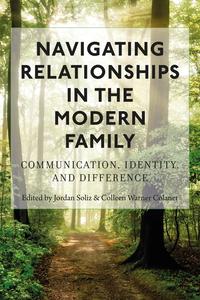
Despite growing recognition of the diversity of family forms and structures, discourses among family scholars and practitioners as well as in popular culture continue to operate from the assumption that families are fairly homogeneous in terms of the values and beliefs, social positions, and identities of individual family members. Navigating Relationships in the Modern Family provides a unique and important perspective on how communication within and about families related to issues of identity and difference can ameliorate negative processes and, at times, potentially amplify positive outcomes such as well-being and relational solidarity. Chapters in this edited volume focus on divergent social identities in the family (e.g., interfaith families, multiethnic-racial families, acculturation and immigration) as well as differences emerging from family formative processes (e.g., stepfamilies, in-law relationships, foster care). In addition to synthesizing the current state of the scholarship in these particular family contexts, each chapter discusses the interplay between families and the larger social and cultural context. For instance, how does grandparent-grandchild communication influence attitudes toward older adults and aging? Can we improve interfaith dialogue in larger societal interactions by understanding communication in interfaith families? How do ideologies of social class and social discourses about adoption and foster care influence family functioning? Chapters conclude with a discussion on implications for scholars and family practitioners. The edited volume would make an ideal primary or secondary required text for upper-level undergraduate and graduate courses on families as well as specialized family courses on understudied family relationships and forms. The volume also serves as an important resource for family scholars and practitioners.